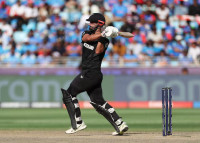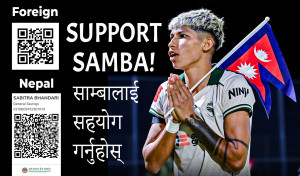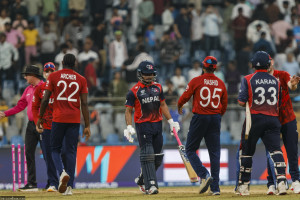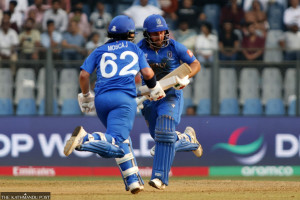Sports
On day one of South Asian Games, gold rush and records for Nepal
Emotions ran high on Monday as the host nation reestablished itself as a martial arts powerhouse.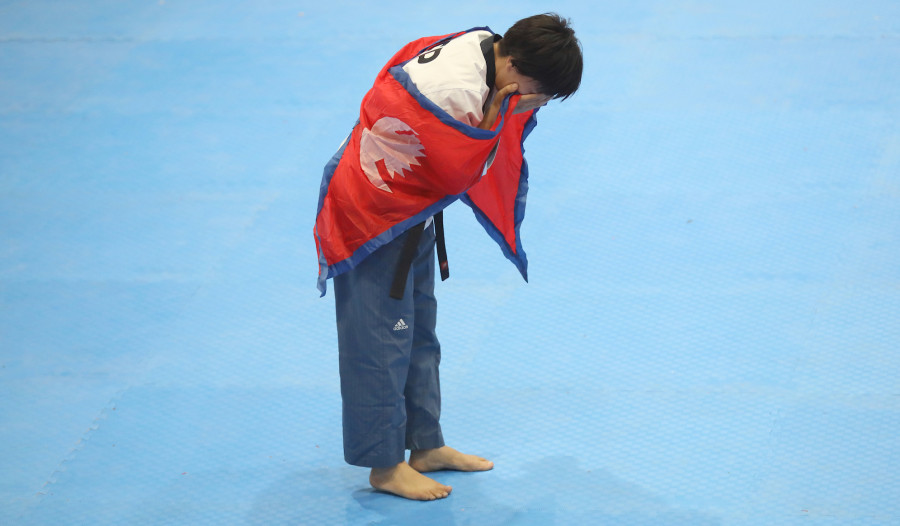
Arpan Shrestha
The first day of the 13th South Asian Games saw gold medals rain as Nepali karatekas and taekwondoins outsmarted their opponents to prove, once again, that Nepal is the powerhouse of martial arts in South Asia. The athletes did so in style and grit that reminded many of Nepal’s early years of absolute dominance in the region.
All this despite the government’s lackadaisical support for Nepali athletes, who often find themselves undertrained and underequipped in the final weeks leading to big tournaments where they represent the country and are expected to strike gold.
Nepal claimed a total of 24 medals on home ground on the first day of the biggest sporting event in the region—15 gold, 3 silver and 6 bronze. Compared to the last edition of the Games hosted in India, when Nepal came in sixth with only 60 medals—3 gold, 23 silver and 34 bronze, this is a huge moment for the country’s sports, especially for karate, which was not included as a discipline then.
“Martial arts are disciplines that have fetched the highest number of medals in international tournaments but we feel our sport, especially karate, has never received government attention,” said Manday Kaji Shrestha, who clinched a double gold on the first day of the 13th South Asian Games and became the first Nepali to do so. “We can emerge as one of the top teams in Asia if the government invests on us.”
Out of the nine gold medals up for grabs in karate on the first day of the tournament, Nepali karatekas secured seven, including the double gold by Shrestha in men’s individual and team kata event with Mahasus Tamang and Prabin Manandhar.
“We are hopeful of winning five to six gold medals in the next two days,” said Shrestha.
Similarly, Sangita Malla, Nirmala Tamang and Saru Karki also claimed gold in the women’s team kata category.
In the men’s kumite event, Laxman Tamang (U-55kg) and Biplav Lal Shrestha clinched gold for Nepal, while Kusum Khadka (U-45kg) and Anu Adhikari (U-50kg) finished on top spots. Adhikari, who won both her bouts in technical knockouts of 8-0, had no match.
Chanchala Dunuwar and Diwas Shrestha had to settle for silver medals in women’s individual kata and U-84kg kumite events respectively, cutting short Nepal’s clean sweep on gold medals by two.
Nepal will be competing for 10 more gold medals in karate in the next two days.
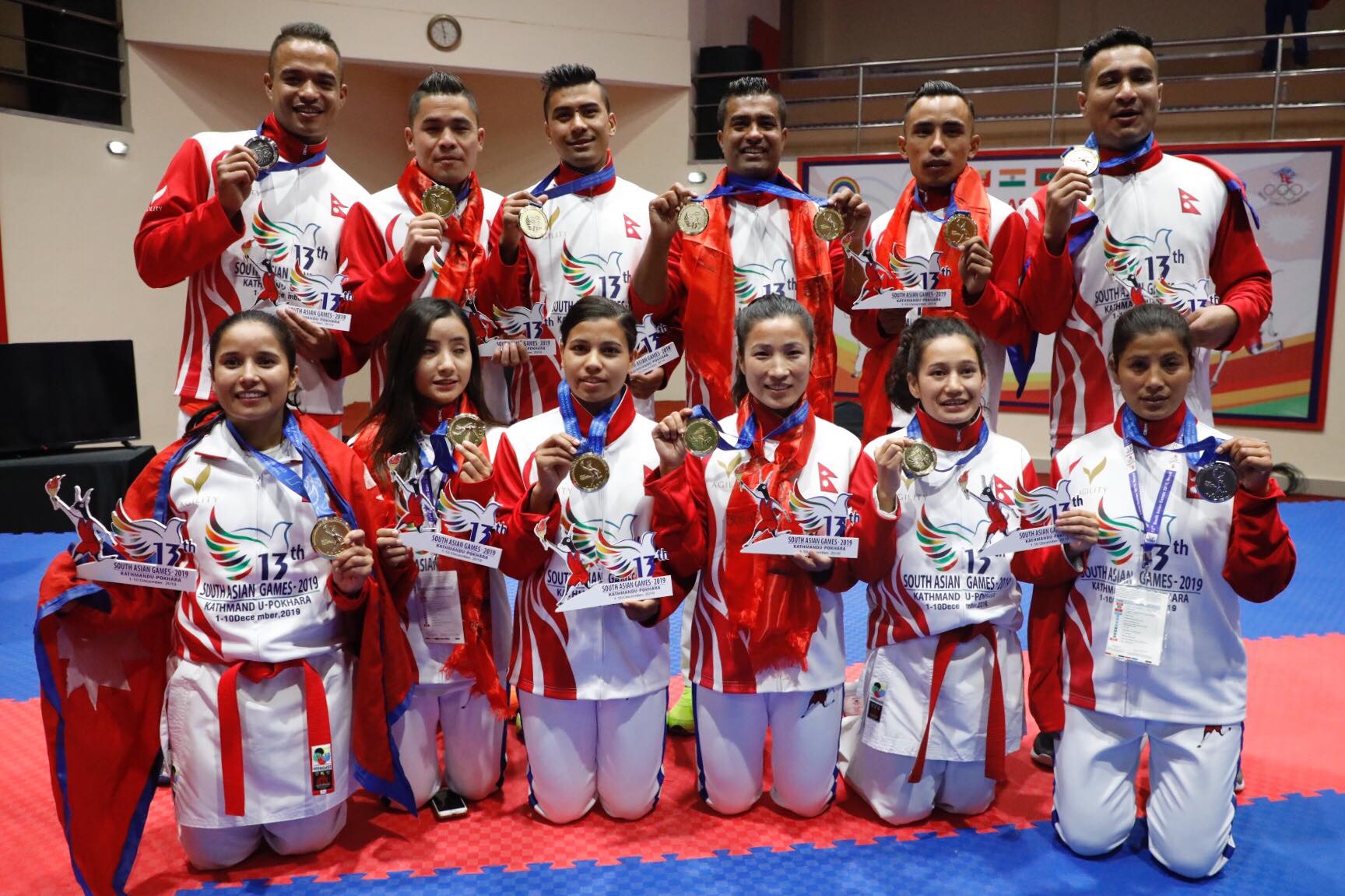
Emotions also ran high in Nepal’s taekwondo camp with Nepal’s senior taekwondoins striking seven gold medals and creating history while breaking the dry spell of gold medals since the 1999 edition of the Games, when Nepal finished second with a record haul of 14 gold medals out of the total 31.
“The outcome is a result of our tireless players and coaches. We will be competing for 16 more gold medals in the next three days. Today’s success will inspire other players to do better,” said chief coach Nabin Shrestha.
“We had the home ground advantage, no doubt, but the government needs to come up with plans and back it up financially if we want to retain our success.”
On the first day of the tournament, Nepali taekwondoins pocketed seven gold medals out of 13, including a double gold by Ayasha Shakya, who became the second Nepali and the first Nepali woman athlete to set the record for two golds in the Games.
Shakya first won gold for women’s individual poomsae (29 years above). No sooner, she struck another gold in pair poomsae (29 years above) with Sanjib Kumar Ojha. Similarly, Ashmin Raut and Sina Limbu Maden (17-23 years) and Jit Bahadur Bot and Parbati Gurung (23-29 years) settled for bronze.
Both Maden and Gurung also claimed a gold medal in women’s individual poomsae under respective weight categories.
Nepal’s women team (17-23 years) comprising of Nisha Darnal, Swastika Tamang and Sanjila Timalsina also added one gold in the women’s team poomsae. Another team, of Nita Gurung, Prashansa Chhetri and Shushila Rai (23 years above), pocketed one more gold for Nepal in the women’s team poomsae.
Similarly, Kamal Shrestha, Jit Bahadur Bot and Prem Bahadur Limbu (23 years above) settled for bronze in the men’s team poomsae.
In the men’s individual poomsae, Kamal Shrestha (23-29 years) bagged gold, while Krishna Bahadur Tamang (17-23 years) and Rejin Rimal (29 years above) settled for silver and bronze medals.
In the triathlon event held in Pokhara, Soni Gurung secured a gold medal in the women’s category, while Basanta Tharu won bronze for Nepal in the men’s category.
Nepal’s medal haul could see bigger results on Tuesday when its judokas and wushukas enter the arena to compete for 15 and 22 gold medals, respectively.
Judo and wushu are two disciplines besides football in which Nepal secured a gold medal each in the last edition of the Games. Since then, both squads have demonstrated immense progress in international tournaments and Nepal bets on their performance to better its position as it hosts the tournament on home ground.
“Judging by the performance of our judokas, we are hopeful that they will deliver good results,” Devu Thapa, a former Olympian and coach, told the Post. “We don’t consider the Indian team a competition anymore. We’ve accomplished a lot and won gold medals in various categories.”
Judo contributed two silver and six bronze medals while wushokas bagged 10 silver medals and one bronze medal in the last edition. “We have the home ground advantage and our wushokas have recently improved their world rankings,” said Coach Mohan Bahadur Pandey Magar. “We will be a force to be reckoned with.”




 20.52°C Kathmandu
20.52°C Kathmandu





